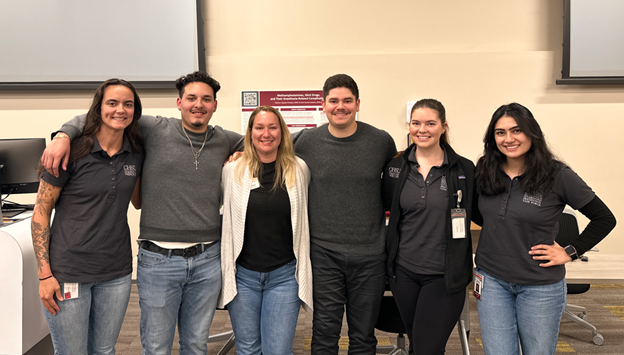Overdose Prevention Committee Hosts Substance Use Disorder Recovery Panel
April 10, 2025

Written by: Mariya Leshchuk (CHSU-COM Class of 2027)
On Tuesday, April 1, 2025, the Overdose Prevention Committee (OPC) at California Health Sciences University College of Osteopathic Medicine (CHSU-COM) hosted a substance use disorders (SUD) and recovery panel. The panel included Miranda Rogers – Alcohol and Other Drug (AOD) Prevention and Recovery Specialist; Julian Carvajal – Community Outreach Coordinator at PAIN Nonprofit; and Sigi Rodriguez – Clinical Outreach and Treatment Placement at First Steps Recovery.
SUD is a complex condition in which there is continued use of a substance (i.e. drugs, alcohol) despite its harmful effects. According to American Addiction Centers, 48.5 million (16.7%) Americans (aged 12 and older) battled a substance use disorder in the past year. Due to its increasing prevalence, medical students need to understand and appreciate the complexity of managing SUD. Diagnosis and treatment vary greatly from patient to patient, often requiring a multidisciplinary approach and substantial outpatient support. Patients present with differing resources and circumstances, making recovery challenging because there is not a one size fits all approach. However, bringing awareness and insight into disease management will aid medical students become future physicians better equipped to provide their patients with the best possible care.
The panelists shared their unique stories and personal journeys with SUD and recovery, which for some started as an adolescent. Despite the differences in their experiences, common themes emerged from their stories. The speakers highlighted how healthcare professionals promoted and inhibited their recovery, the impact of community support groups, and the meaningful conversations that supported their recovery. They spoke openly about the challenging cycles they endured and emphasized the steps that ultimately resulted in recovery.
Key topics addressed the importance of destigmatizing SUD by recognizing that individuals are struggling with a disease – not defined by it. Miranda Rogers stated, “The fear tactic of ‘drugs are bad, if you do them you’re bad’ has good intentions, but lacks the education and compassion to go with that message.” Ongoing support and consistent encouragement to engage in recovery programs played a crucial role in helping the panelists heal. The hospital and emergency department were often recognized as the only “safe space” and, for many, a last resort. Healthcare professionals have a unique opportunity to support patients during these deeply vulnerable moments and are encouraged to not disregard their recovery attempts. Hearing their stories helped students identify humanistic approaches to treating SUD and gain a deeper understanding of how to support individuals on their path to recovery.
OPC sincerely thanks the panel speakers for sharing their stories and encouraging CHSU-COM students to engage in SUD conversations early in their career.